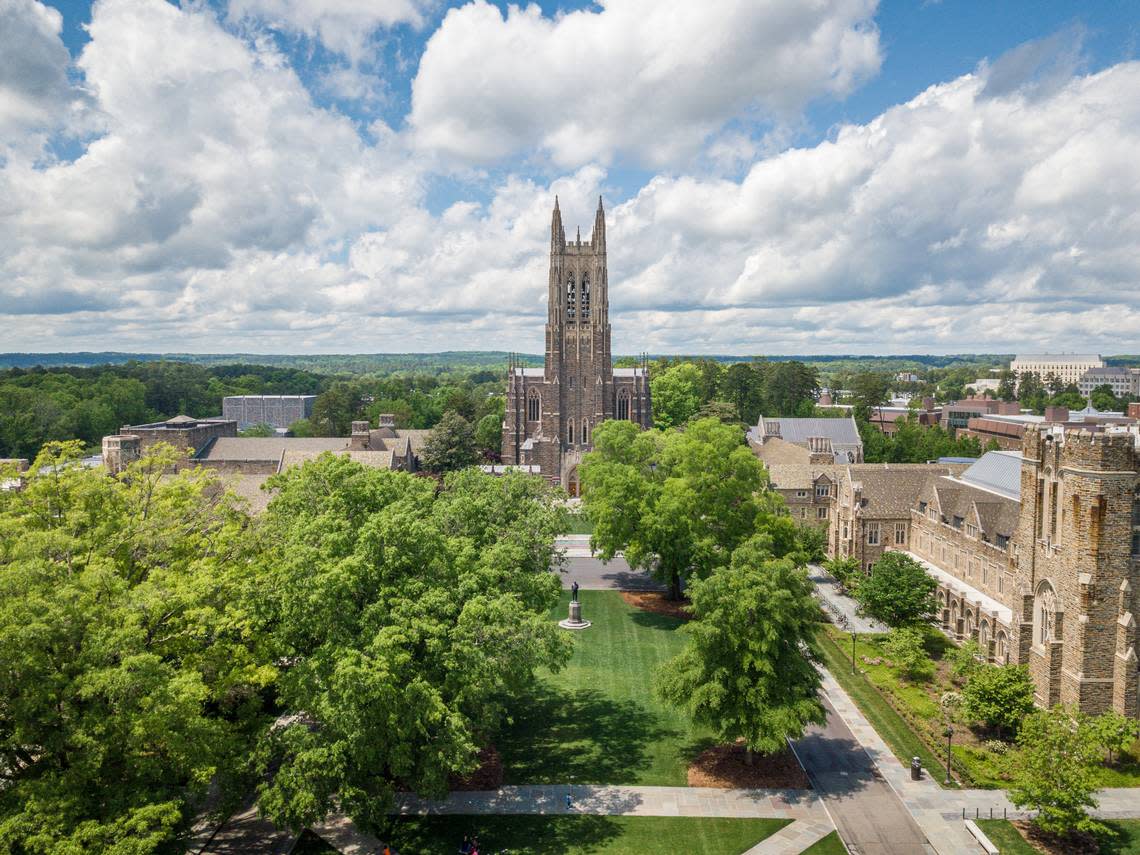Duke gets its largest donation ever. How it will help students, including HBCU grads

- Oops!Something went wrong.Please try again later.
Duke University will turn 100 next year, and it has lots to celebrate — including the largest-ever single donation in its history, the university announced Thursday.
The Duke Endowment, which is a philanthropic foundation separate from the university, has awarded the university $100 million to fund a variety of student support and community engagement initiatives.
“This is a wonderful moment for Duke as we head into our centennial, a centennial that we share with the Duke Endowment,” Duke President Vincent Price told The News & Observer Wednesday. “They have been an important philanthropic partner to Duke University throughout our history, and this marks just a wonderful moment for our future growth and development as we look forward to the next 100 years.”
The Duke Endowment, established by and named for industrialist James B. Duke, provided the original funds for Trinity College to become Duke University in 1924 and remains the university’s largest donor.
The newly announced funding will support, in part, the university’s initiative to offer free tuition to students from North Carolina and South Carolina whose families have annual incomes of $150,000 or less, announced in June. That initiative, which also covers additional costs of housing, meals and other expenses for students from the Carolinas whose family incomes are $65,000 or less, is supporting more than 340 undergraduate students this semester.
The endowment’s gift will be “a major source of funding” for that initiative, Price said, though the university will continue to raise money for the program as demand for it increases.
Graduate and professional students at Duke who hold bachelor’s degrees from historically Black colleges and universities (HBCUs) and other minority-serving institutions (MSIs) will also receive support from the gift — likely in the form of direct financial support and outreach efforts, Price said. Preference for that support will be given to students who graduated from HBCUs and MSIs in the Carolinas.
That effort, Price said, is intended to ensure “that we have a diverse and talented group of graduate and professional students.”
When the U.S. Supreme Court last summer ruled that considering race in college admissions is unconstitutional, experts said colleges, particularly those that are most selective, would need to rethink their strategies to diversify their student bodies.
“We have a firm institutional commitment to creating access and opportunity for students, particularly students who haven’t had the resources of an institution like Duke University,” Price said. “So, making sure that we bring into Duke a class that is socioeconomically diverse, racially and ethnically diverse, geographically diverse, that we have rural students alongside students who come from urban centers around the world — that rich diversity has tremendous educational benefit to every single student, faculty or staff member.”
That “vision” for the university will be “realized” through the programs that the new funding provides, Price said.
The award will also fund modernization of the Wilhelmina Reuben-Cooke Building on Duke’s West Campus “to support collaborative and interdisciplinary learning,” per an announcement from the university. One of the original buildings on campus, named for one of the first five Black students who integrated Duke’s campus in 1963, the facility will have updated classroom and research spaces, among other improvements, Price said.
“We’ll open it up,” Price said. “It will be brighter and warmer and everything that our faculty, staff and students deserve as a place to live and work.”
The award will also provide:
Ph.D. and professional school fellowships in all of Duke’s schools, including medicine and nursing.
Matching funds to support undergraduate financial aid.
Experiential learning opportunities for undergraduates and graduate students.
A support fund for the Duke Law Clinics, which provide free legal assistance to North Carolina residents.
The Duke Endowment has donated nearly $2 billion to the university and Duke Health.
“Over the past 100 years, support from The Duke Endowment and its trustees has played a key role in the university’s growth and development,” Charlie Lucas, chair of the endowment’s board, said in a news release. “Strengthening communities in North Carolina and South Carolina through education is central to James B. Duke’s philanthropic vision. This award is a direct reflection of his desire to make a high-value education accessible to all and support students from across the Carolinas.”

